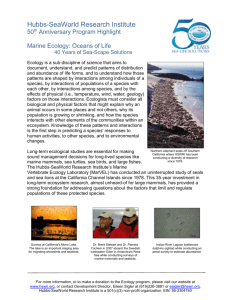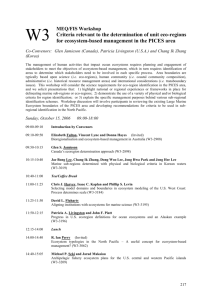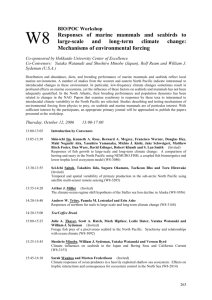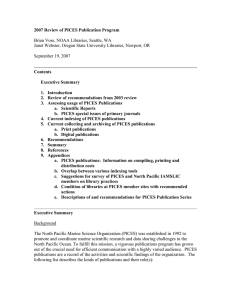Draft Agenda for Marine Birds and Mammal Advisory Panel at
advertisement
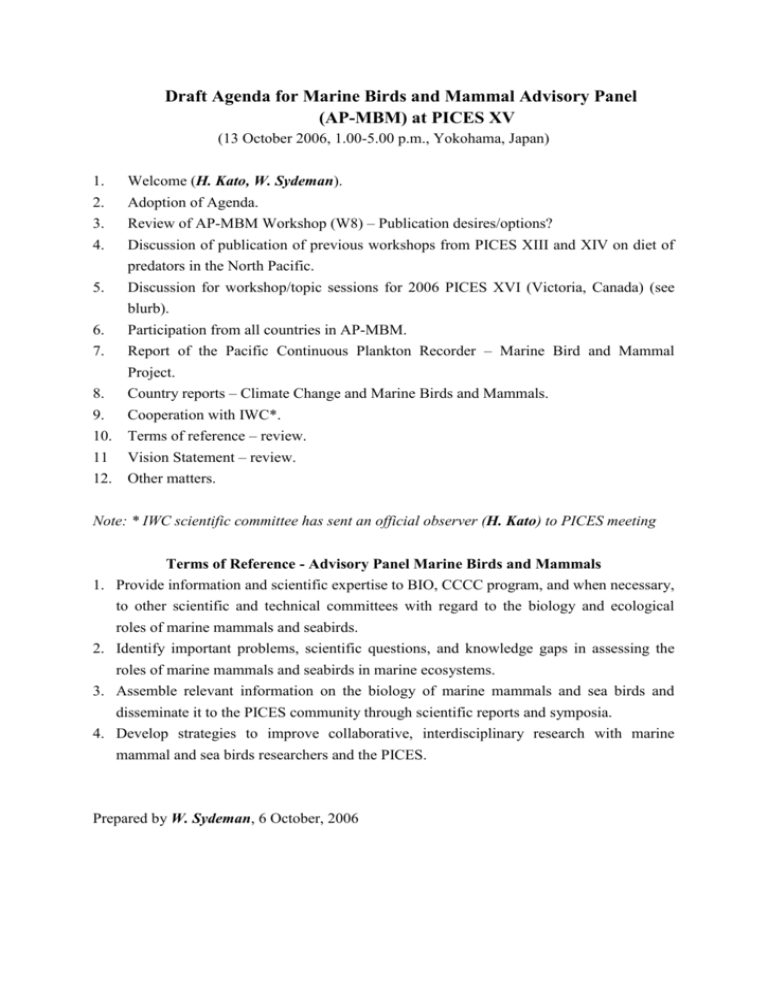
Draft Agenda for Marine Birds and Mammal Advisory Panel (AP-MBM) at PICES XV (13 October 2006, 1.00-5.00 p.m., Yokohama, Japan) 1. 2. 3. 4. 5. Welcome (H. Kato, W. Sydeman). Adoption of Agenda. Review of AP-MBM Workshop (W8) – Publication desires/options? Discussion of publication of previous workshops from PICES XIII and XIV on diet of predators in the North Pacific. Discussion for workshop/topic sessions for 2006 PICES XVI (Victoria, Canada) (see blurb). 6. 7. Participation from all countries in AP-MBM. Report of the Pacific Continuous Plankton Recorder – Marine Bird and Mammal Project. 8. 9. 10. 11 12. Country reports – Climate Change and Marine Birds and Mammals. Cooperation with IWC*. Terms of reference – review. Vision Statement – review. Other matters. Note: * IWC scientific committee has sent an official observer (H. Kato) to PICES meeting Terms of Reference - Advisory Panel Marine Birds and Mammals 1. Provide information and scientific expertise to BIO, CCCC program, and when necessary, to other scientific and technical committees with regard to the biology and ecological roles of marine mammals and seabirds. 2. Identify important problems, scientific questions, and knowledge gaps in assessing the roles of marine mammals and seabirds in marine ecosystems. 3. Assemble relevant information on the biology of marine mammals and sea birds and disseminate it to the PICES community through scientific reports and symposia. 4. Develop strategies to improve collaborative, interdisciplinary research with marine mammal and sea birds researchers and the PICES. Prepared by W. Sydeman, 6 October, 2006 Phenology and climate change in the North Pacific: Mechanisms of response from plankton to predators. Conveners: William J. Sydeman (USA), and ? North Pacific ecosystems are characterized by strong seasonal variability in ocean productivity. Projections of climate change indicate that substantial changes in phenology (timing events), and biological interactions that depend on the seasonal cycle, are likely. Productivity of fish, marine mammals, and seabirds is dependent on the interplay of timing of physiological changes and reproductive activities in relation to prey availability. Several major hypotheses have been set forth to explain changes in fish production in relation to timing, including “match-mismatch” (Cushing, 1990) and “optimal environmental window” (Cury and Roy, 1989). In light of climate change predictions and recent major shifts in phenology in some North Pacific ecosystems (e.g., late upwelling in the California Current in 2005), we propose a full day topic session for PICES XVI to investigate phenological trends in plankton to predators, predator-prey and trophic relationships, and mechanisms of change in phenological aspects of physiology, reproduction, migration, and behavior, etc. Papers which test the above hypotheses or which present new theoretical treatments and/or models of species-specific life history variation are strongly encouraged. In particular, multi-trophic level, multi-disciplinary integrative analyses are sought. We anticipate publication of the topic session in the primary literature. Invited Speakers: Joel Durant (Norway), William Montevecchi (Canada), Sonia Batten (England), H. Tadakoro (Japan), ??

